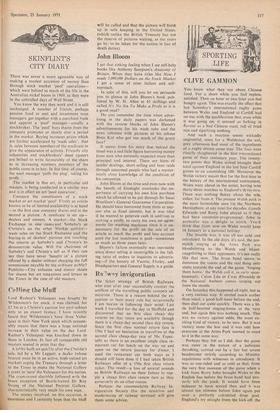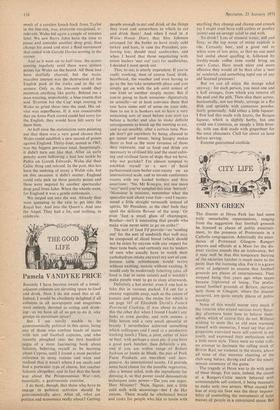CLIVE GAMMON
You know what they say about Chinese food. For a short while you feel replete, satisfied. Then an hour or two later you feel hungry again. This was exactly the effect that last Saturday's international rugby game between Wales and England at Cardiff had on me, with the qualification that, even while it was going on, it seemed as lacking in flavour as a bad Chinese meal, full of fried rice and signifying nothing.
And such a reaction seems wickedly ungrateful, since for a Welshman the wet, grey afternoon had most of the ingredients of a rugby dream come true. The Saes were ritually slaughtered in the first international game of their centenary year. The twenty- two points that Wales scored brought their total against England in the last four Cardiff games to an astonishing 100. Moreover the Welsh victory meant that for the first time in the history of the international tournament, Wales were ahead in the series, having won thirty-three matches to England's thirty-two. There was nothing flukey about the win, either, far from it. The present Welsh pack is the most formidable seen (in the. Northern Hemisphere, at any rate) for decades. Gareth Edwards and Barry John played as if they had been computer-programmed: John in particular was a delight to watch. You'd think that from now on Wales would keep 16 January as a national holiday.
The trouble was, it was all too cold and calculated. In the old days, it's said, the pre- match singing at the Arms Park was bloodstirring to the Welsh and blood- coagulating to their opponents. It's not really like that now. The brass band seems to dominate the voices and the real thing only starts towards the end of the game. 'Singing them home,' the Welsh call it, as ouite spon- taneously. Caton Lan or Cwm Rhondda or the National Anthem comes surging out from the stands.
On Saturday this happened all right, but in a very curious way. It started much earlier than usual, a good half-hour before the end, then died out quite quickly. There was a lit- tle half-hearted singing-home at the very end, but again this was nothing much. This was no victory against odds, the most ex- citing kind of victory, to be sure. But it was victory none the less and it was odd how everyone at the Arms Park seemed to react to it in the same way.
Perhaps they felt as I did, that the game was more in the nature of a judicious thrashing, carried out by a fair but severe headmaster strictly according to Ministry regulations with witnesses in attendance. It was as one-sided and as cold as that, from the very first moment of the game when a kick from Barry John brought Wales to the English line before the brass band had pro- perly left the pitch. It would have been indecent to have scored then and it was almost ten minutes before John again put over a perfectly calculated drop goal. England's try straight from the kick-off, the result of a careless knock-back from Taylor in the line-out, was, everyone recognised, ir- relevant. Wales led again a couple of minutes later. We saw Barry John have the time to pause and consider another drop goal, then change his mind and start a fluid movement that ended with Gerald Davies scoring in the corner.
And so it went on to half-time, the scores coming regularly until there were sixteen points for Wales on the board. All these had been dutifully cheered, but the main, macabre interest was the destruction of the English pack in the nicks and in the set scrums. Only in the line-outs could they maintain anything like parity. Behind me a man wearing, improbably, a blue rosette that said 'Everton for the Cup' kept roaring to Wales to grind them into the mud. His ad- vice was superfluous, If it was conceivable that an Arms Park crowd could feel sorry for the English, they would have felt sorry for them then.
At half-time the statisticians were pointing out that there was a very good chance that Wales could establish a new record of points against England. Thirty-four, scored in 1967, was the biggest previous total. Surprisingly, it didn't turn out like that. After an early penalty score following a bad late tackle by Pullin on Gareth Edwards, Wales did their Celtic thing and relaxed. In the past, this has been the undoing of many a Welsh side, but on this occasion it didn't matter. England could only pick up three penalty points and these were negated by another spectacular drop goal from John. When the whistle went, for England it was a gentle euthanasia.
We surged out into the wet. Already they were queueing in the rain to get into the Royal bar. And into the Queen's. And into the Angel. They had a lot, and nothing, to celebrate.






































 Previous page
Previous page